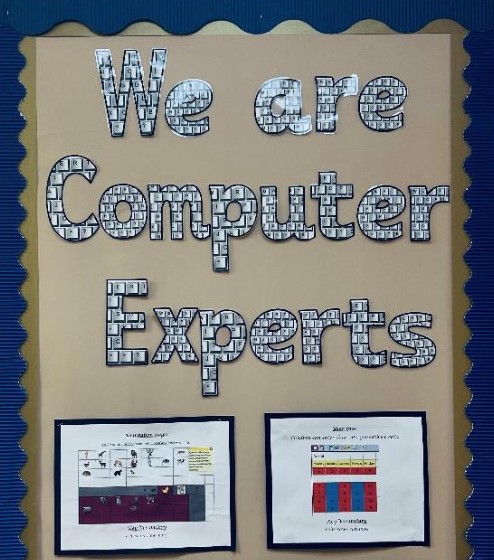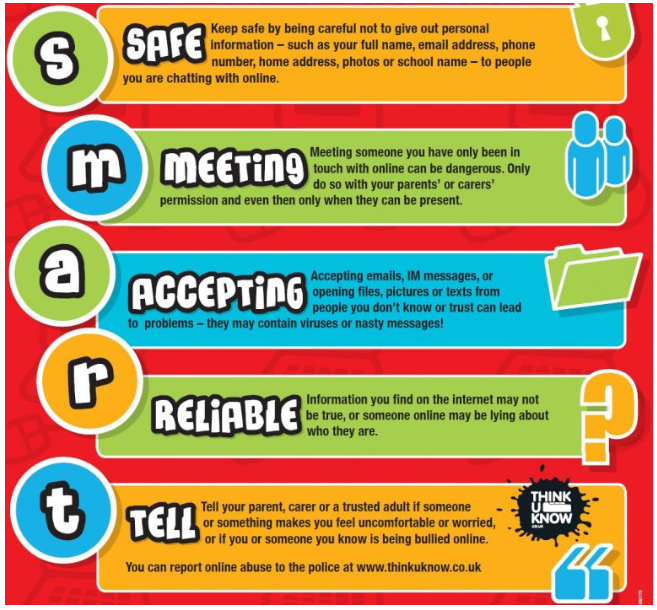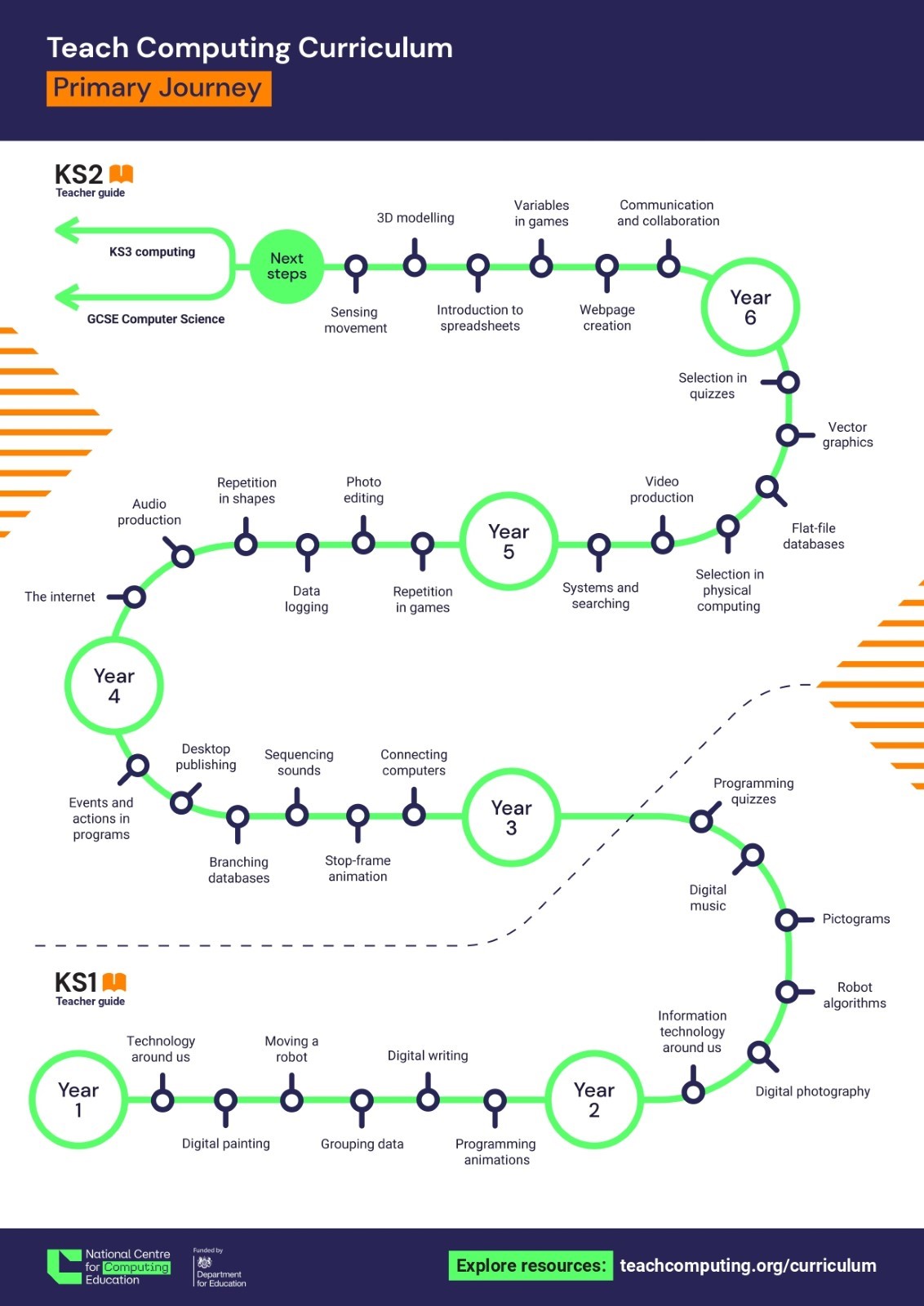Computing
At Croxby Primary School we are Computer Experts!

Intent
At Croxby Primary School we are COMPUTER EXPERTS!
Our aim is that, through the teaching of Computing, all children participate in an inclusive and ambitious curriculum that not only encompasses the latest research in computer science but also adheres to a set of pedagogical principles aimed at fostering comprehensive understanding.
This curriculum delves into ten main strands of learning; algorithms, computer networks, computer systems, creating media, data and information, design and development, effective use of tools, impact of technology, programming and safety and security. Through these engaging modules, students embark on a journey encapsulating the discipline of computing.
Each year, the curriculum is designed to revisit key topics, thereby reducing the loss of knowledge. The ten strands of learning each build upon the previous year to progress skills as the children move through the school.
Integral to the curriculum is the incorporation of physical computing, which not only supports but also engages a diverse range of students in tangible and challenging tasks, reflecting modern pedagogical approaches. Children will first learn about algorithms as a simple set of instructions that we can physically follow, before applying this to a computing and calling it programming.
Moreover, online safety is given paramount importance, with dedicated instruction at the onset of each academic year to cultivate digital citizenship.
Implementation
Carefully curated by the National Centre for Computing Education, TeachComputing is built around recent computing research under-pinned by pedagogical approaches such as leading with concepts, working together, getting hands-on, unplugging, unpacking and repacking, and explicit modelling.
*Knowledge notes are an elaboration in the core knowledge found in knowledge organisers. Knowledge notes focus pupils’ working memory to the key question that will be asked at the end of the lesson. It reduces cognitive load and avoids the split-attention effect.
*Retrieval practise is planned into the curriculum through spaced learning and interleaving and as part of considered task design by the class teacher. Teaching and learning resources and provided for class teachers so they can focus their time on subject knowledge and task design.
*Learning graphs for each unit highlight which lessons explore concepts and which apply skills. This is made explicit to the students, developing their understanding of what they are learning that lesson and how their skills are implemented.
*Collaborative working is paramount within our computing curriculum. We promote collaboration, particularly through pair programming, peer instruction, and structured group tasks. Collaborative work encourages classroom dialogue, the articulation of concepts, and the development of shared understanding amongst students.
*Vocabulary is explicitly taught throughout each computing unit. Vocabulary serves as a label that identifies concepts. To link a concept with the correct term, we first introduce and explain the key term, and then delve into the related concept, making it more tangible for our students. This allows the children to discuss what they are learning like computer experts.
*Misconceptions - Through formative questioning, we uncover misconceptions and adjust our teaching to address them in real-time. Staff members are vigilant about common misconceptions and address them through discussions, concept mapping, peer instruction, and simple quizzes to pinpoint areas of confusion.
*Assessment is carried out through formative questioning in KS1 which then progresses to both formative and summative assessment based on multiple choice questioning for KS2.
Safe and responsible use of technology is of paramount importance to us. All children will be taught our SMART rules on entering Croxby and internet safety is a key part of our learning in every year group.

Impact
The impact of this curriculum design will lead to outstanding progress over time across key stages relative to a child’s individual starting point and their progression of skills.
HOW DO WE KNOW WHAT CHILDREN HAVE LEARNED?
-
Questioning
-
Pupil Study (talking about learning with the children)
-
Talking to teachers
-
Low stakes ‘Drop-in’ observations
-
Quizzing and retrieval practise
-
Live feedback
Children will therefore be expected to leave Croxby reaching at least age-related expectations for Computer Technology and lead to pupils being enthusiastic technologists.
What is my child learning?
Here is the computing long-term overview.

EYFS
The ‘Technology’ strand was removed from ‘Understanding the World’ in the new Early Years Foundation Stage Curriculum which was released in September 2021. Does this mean that we no longer teach computing and technology to our foundation stage pupils? No! Computing and technology are still extremely important subjects to deliver to our youngest learners.
Our computing and technology learning in Early Years takes place in play-based, unplugged (no computer) activities that focus on building children’s curiosity, creativity, problem solving and listening skills. Computing and technology learning in Early Years can mean pretending to take photos with cameras in our role-play area, playing games on the interactive whiteboard, exploring old mechanical toys, using Beebots, watching video clips, listening to music and following algorithms for everyday tasks such as washing your hands or lining up.
We support our computing and technology development learning through sharing stories, learning about online safety and when in provision. Our children enjoy the valuable experiences gained from exploring technology in provision and in learning key vocabulary, such as ‘algorithms’ that will help them to be successful learners in their future computing learning.
Our skilled early years practitioners encourage exploration of computing and technology and knowledge about staying safe online by giving children time to explore, comment and ask questions about what they have experienced, played and learned. We raise questions such as, ‘How does this work?’, ‘What can this piece of technology do?’, ‘Have you used something like this before? What was it for?’, ‘Who can you tell if you feel unhappy when playing online?’, ‘Who keeps you safe when you play a game online?’, ‘What are our SMART rules?’, ‘If I press this button, what will happen to the Beebot?’, ‘How can I move the Beebot from here to there? What can I do? Shall we try?’, ‘What is the algorithm for washing our hands?’ ‘Can you think of something else that we can write an algorithm for?’ and ‘Why should we never go on the computer/phone/internet without telling an adult first?’
Computational thinking is woven throughout the curriculum is foundation stage. Without realising it, children are applying concepts such as abstraction, evaluation and logic whilst using approaches such as debugging, persevering and tinkering. These are all examples of computational thinking which are developed in year one. Our foundation stage children are also exposed to creating digital media through use of the smart boards during provision time.
Use of language relating to computing and technology development is used in daily conversations with children for example, ‘safety’, ‘online’, ‘internet’, ‘password’, ‘private’, ‘never share’, ‘technology’, ‘go’, ‘forward’, ‘backwards’, ‘rotate’, ‘algorithms’ and ‘function’. We ensure we are preparing our young pupils to be safe online and have some understanding of the different roles of technology by equipping them with the necessary skills to be successful in their future personal development learning by developing the disciplinary skills at an early stage.
